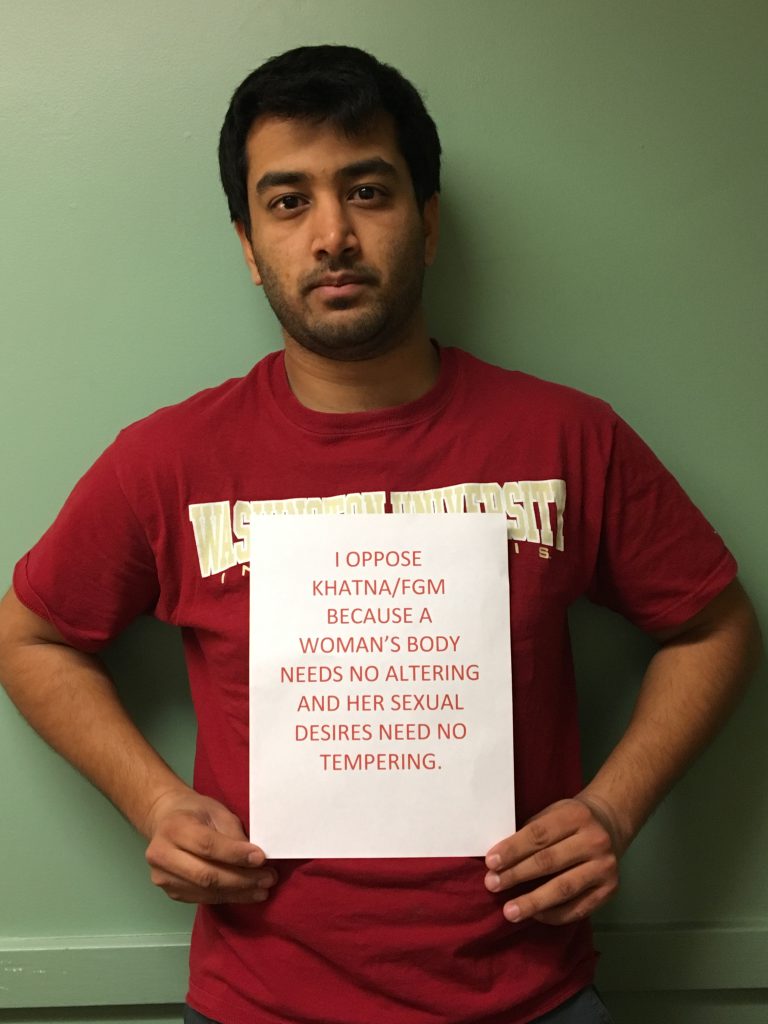FGM and the myth of modernity among Dawoodi Bohras
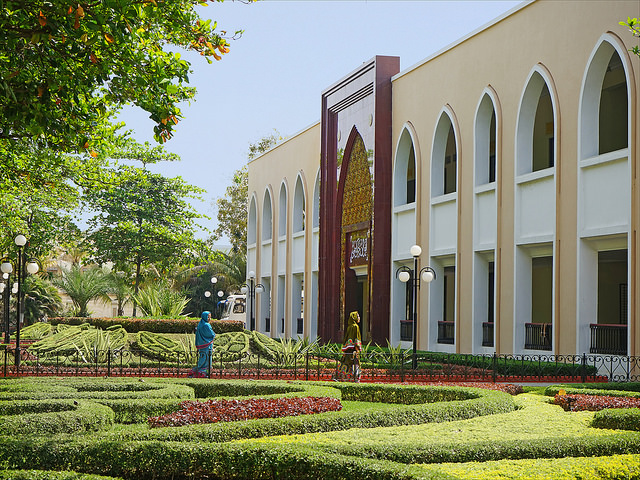
By: Anonymous Age: 33Country of birth: IndiaCountry of current residence: USA I am a male born into a Dawoodi Bohra family. My brother and I had remarkably normal upbringings in the United States. We were members of one of the more secular congregations in the in the US. My parents always pointed out to me how different we were from other Muslim sects. Our community stressed education for our sons and daughters. Many women in our community are business owners, doctors, and primary bread winners. Wahabi, we were not. I distinctly remember watching an episode of the news program “20/20” with my parents when I was a “tween”. One of the pieces was on female genital mutilation in Somalia. We watched the whole piece and a hush came over the room…the kind of awkwardness one experiences when a love scene comes on while you’re watching a movie with your parents. I didn’t know why my parents were squirming, but in a few days everyone forgot all about it. Fast forward over a decade and I’m in a serious relationship with my now wife. A Dawoodi Bohra woman. The first time we were intimate she began crying uncontrollably. She told me what had been done to her. She herself didn’t know what had been done to her until she learned about it in college. She felt an electric shock like pain down to her toes when it was done, but I was the first to be rocked by the waves of that ripple effect. She felt scarred and damaged. She wanted so bad to connect with me intimately, but it could never happen. That had been stripped away from her along with her ability to be a complete woman, against her will, as a minor. We worked through it together. I went to her counseling appointments. I reassured her that our love would only grow stronger, but she and I both knew no one could ever give back to her what was lost in that moment. The “20/20” moment finally made sense. With two sons, my parents never had to make the gut-wrenching decision to physically alter their children, but to be perfectly clear, had either of us been a girl, there would have been overwhelming pressure to do it. The community would feed their boilerplate lies: “it is to ensure a good marriage”, “it is to make you a better wife”. I later found out from my parents that all the girls in my family had it done to them. I couldn’t stomach the thought. Why put up the front of modernity when 50% of your offspring are subjected to a medieval practice? Stop flaunting your women’s independence when your prerequisite for them to be complete spiritually is for them to be incomplete physically. My amazing wife has taught me so much. She has taught me forgiveness, and strength. I would certainly have been much more vindictive had I been put in her shoes. It is time for all Dawoodi Bohras to come to grips with this issue. It is a stain on the faith. It has no precedence in Islam, it irreversibly damages our women, and it runs counter to what we claim to be: modern, moderate Muslims. It’s time to bring this issue out of the shadows and into the light. This article was later republished in Gujarati. Read the Gujarati version here.
FGM/C is neither beneficial nor relevant to modern times. Let’s end it

By Ali Asghar Akhtar Country: Canada Age: 33 I recently came to know about something very prehistoric (I am not being overdramatic, it was truly shocking for me). We are living in a digital, global, mobilized world where everyday living dynamics are being challenged and improved. Changes in technology, social norms, cultures, historic traditions and even daily mundane rituals have been drastic and entire paradigms have shifted. We term these changes as “progress”. However, when I recently learned that FGM/C (Female Genital Mutilation or Cutting) is still prevalent in today’s “modern era”, I was very surprised and shocked. I learned that FGC was still happening from one of my cousins living in the United States of America, who is a subject matter expert in this area. She told me that FGM is still practiced and in fact, in our community, many are very proud to keep our “traditions alive”. When I delved further on this subject, allowing for a benefit of doubt that it might be beneficial medically for women (as certain learning through religious teachings/beliefs have proved to be beneficial for mankind over the course of history), I learned that this practice has NO significant relevance medically or in terms of religion. This is simply a non-relevant practice which has traditionally been followed over the decades without any benefits. I was again very surprised to learn that no support group had ever challenged this unrealistic tradition until recently when a small group named SAHIYO was formed. I support this group to work towards ending this irrational and illogical tradition which should be banned. Continuous progress only happens when certain traditions are constantly reviewed, challenged, and improved. Progress is not limited to tangible outcomes. Social change and progress happen when attitudes change to help end harmful practices. I humbly request everyone who reads this snippet of information on FGM/C to become part of this organization and help Sahiyo stop this non-beneficial tradition. The existence of such bygone social norms is very perplexing to understand and relate to in today’s 21st century. Let’s together work to STOP FGM/C before it becomes a part of the next generation’s DNA.
Sahiyo teams up with Feminist Challenge 2K17
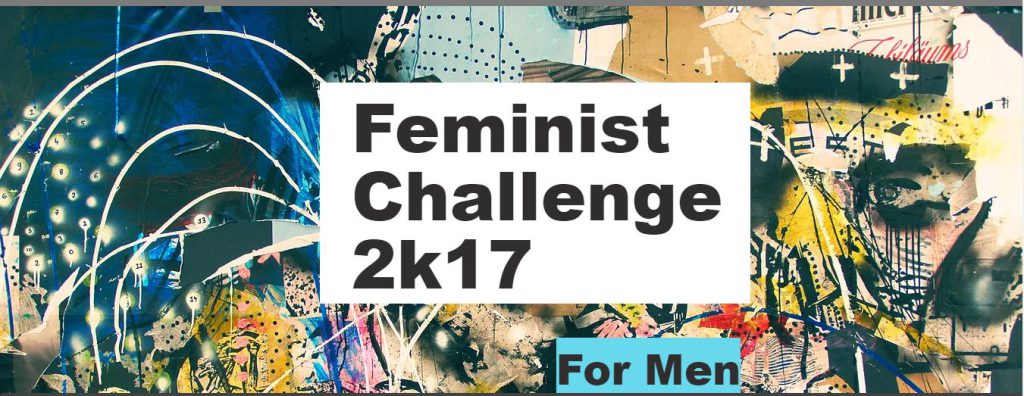
During the week of February 6th, Sahiyo connected with Feminist Challenge to create a challenge around the topic of FGC. Feminist Challenge is an online newsletter created to encourage men to approach empathy with women by building their own personal testimonies of awkwardness, inconvenience, and pain. The belief behind this approach is that performance can add a different level of appreciation above intellectual understanding. The more men fully appreciate the feminist call to equality, the better our society will be. Each week those who have signed up partake in a challenge to help everyone to think more deeply about feminist issues. On February 6th, the challenge on FGC included 1) Watching a story on FGC 2) Reflecting on it by journaling on a) how the person felt after watching, listening, or reading the story b) reflecting on a time in their life where they encountered violence or someone they knew encountered violence. The advocacy event was included as part of Sahiyo’s February 6th events for Zero Tolerance Day. Over 400 people have signed up to take part in Feminist Challenge.
Why the khatna conversation needs men’s voices too

(First published on June 7, 2016) by Ammar Karimjee Age: 24 Country: Pakistan I found out when I was 19. I’d just heard about the practice of female genital mutilation (FGM) in an Anthropology class, and had dismissed it as something that simply happens in rural African villages. After class, I’d expressed disgust to a friend about it, something along the lines of “Can you believe people still do things like this?” The friend was a fellow member of the Dawoodi Bohra community, who in this moment realized I must not have known. After she spoke to me about it, I remained in disbelief. I was sure she must be wrong. I reached out to my mom and sister, and after a few in-depth conversations with them, it settled over me. A mix of emotions – anger, frustration, humiliation – all overcame me simultaneously. I didn’t do anything at first, I just needed some time to let it all sink in. After I’d had time to process, I realized I needed to do something. At first, most of my involvement in my personal anti-FGM campaign came through conversations with people I knew, primarily men. Even in this initial stage, I realized how essential it would be to effectively engage men as part of this movement. Over time, I became involved in a few more formal networks that were also working on this issue, and through these, I’ve had the chance to speak at the United Nations on this issue as well as be a small part of the This American Life podcast a few weeks ago. It’s been an amazing journey to be a part of. Below, I’ve shared some of the major learnings/thoughts I’ve developed over the last 5 years. I hope it can serve as a way for some of you to help think through this topic. If you have questions, there are a ton of us here to help guide you to the answers. If you’d simply like to talk further about this, please do not hesitate to reach out. You can always contact Sahiyo at info@sahiyo.com to become connected to others working on ending FGM. Some men don’t want to even engage in the conversation about FGM. Part of this is because they dismiss it as an unimportant issue at face value, but I believe a larger part of this may have to do with the discomfort that comes with talking about the female body and the lack of knowledge that it results in. As men, we do not intuitively understand the female body and the biological processes that occur within it. Of course, we never will be able to truly know what being a woman feels like, but by gaining an understanding of how their bodies work, we can begin to have an idea. Naturally, we compare things that happen with a woman to its closest direct male counterpart. As such, we associate FGM, or circumcision as many people chose to incorrectly refer to it as, as the equivalent of male circumcision. This is a dangerous fallacy for men to turn to in their justification. The function of the male penis and a woman’s clitoris are not identical – not even close. Further, the benefits that come from male circumcision are simply not present in FGM. Please, please, please, do your research and understand the impact of this practice. It is terribly important for men to be aware of women’s bodies – not just specifically to be able to understand FGM, but for so many other reasons, health and otherwise. For the men who were willing to talk about it, one constant held true – they had never talked about it before. Creating a space to have these conversations became an important part of the larger effort to engage men. But the snowball effect definitely holds true. Individual conversations I was leading turned to group conversations I was just a part of. Soon after, conversations started happening without me there at all. Awareness of FGM in the Bohra community has increased exponentially since I started speaking about this issue, especially in the last few months. However, the conversations happening are still dominated by women. It is of course amazing that so many women have started sharing their stories and thoughts. But we still live in a patriarchal context. Religious leaders are still men. Decision-makers in families are still largely men. We – the men – MUST start caring. We don’t have the option to be silent or ambivalent anymore. We can not keep pretending that it isn’t our problem. These are our friends, our daughters, our sisters, our mothers, and our wives. Read their stories. Understand what FGM is and how it affects them. Once you do, you’ll be as angry as I am. You won’t want it ever happening to anyone you’re close to. We can’t undo what has already happened to hundreds of thousands in our community – but we CAN prevent it from happening from this day forward. To men everywhere – Start reading. Start talking. STOP FGM.
Dear daughter, I am sorry you were circumcised
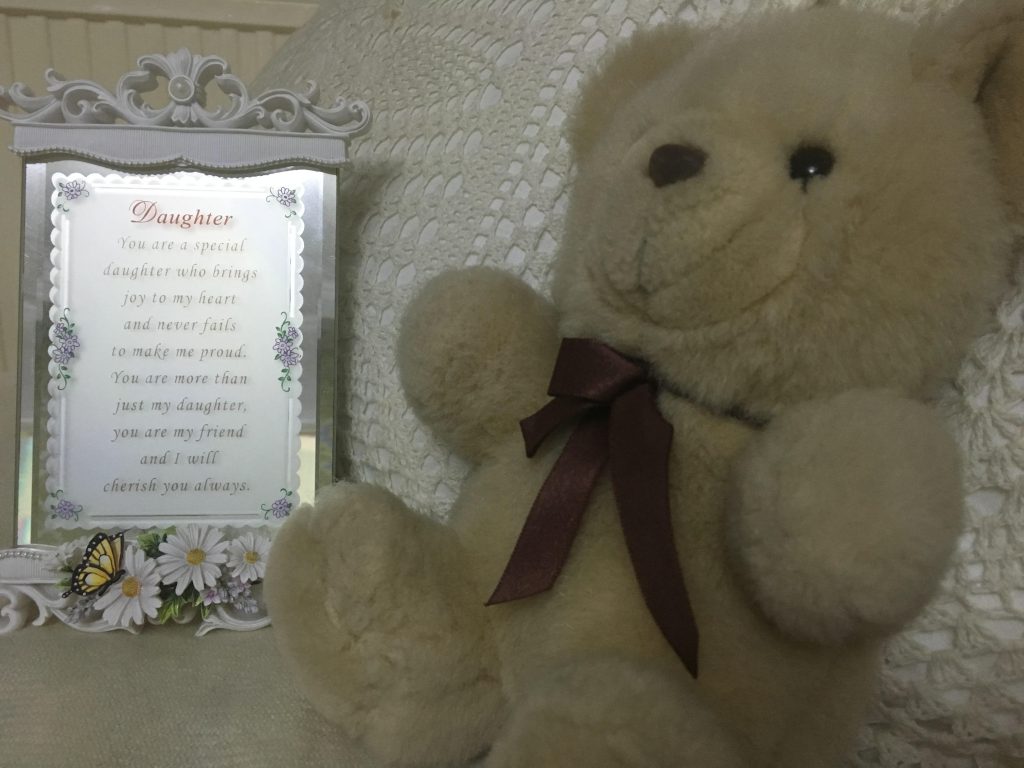
(First published on May 24, 2016) A heartfelt letter from a Bohra father, who wished to remain unnamed, to his grown-up daughter. Read the Gujarati translation of this letter here. Dear Daughter, Many years ago, I made a mistake. Your mother came to me and said “I’m going to have our daughter circumcised.” I knew nothing about this procedure, assuming that your mother knew best. My ignorance is no excuse for what you went through. I’ve asked your mother many times since this occurred, why an educated woman who resides in a country where this is illegal subjected her daughter to this practice? I never received a valid reason. Simply saying that “it’s in our religion” is not a good enough answer for me to accept that my daughter went through this. When I read your account of what happened, my eyes filled with tears. For all of these years I was oblivious to the trauma that you underwent. You were an innocent child. I wonder how many other fathers are in the same position as me – finally learning about this heinous practice and unaware of how their daughters have silently struggled with this for so many years. I remember the first time I held you in my arms and thought to myself “she’s perfect”. You were my little miracle, after years of wanting a daughter, you finally arrived. I’m sorry that something was removed from you, because there was nothing wrong with you to begin with. I know that it is your upbringing and your strong values that prevent you from sinning and nothing else. To think that you were only 5 years old, completely oblivious to what was happening to you and frightened, I’m sorry that I wasn’t there to protect you. Ignorance is never an excuse. Nor is it acceptable to turn a blind eye. I promise you that I will do everything in my power to support the noble cause of finally putting an end to this practice – and ensuring that other fathers become aware of what goes on behind closed doors. A crime against girls, committed by those who love them due to incorrect beliefs and reasons. One day, when you become a mother, I will stand behind you, like I should have done years ago and ensure that this family’s next generation never has to suffer the way that you did. All my love, Dad
વહાલી દીકરી, હું દિલગીર છું તારી ખતના થઇ

વહાલી દીકરી, હું દિલગીર છું તારી ખતના થઇ – એક બોહરા પિતા ની દિલ ની વ્યથા વહાલી દીકરી, ઘણા વર્ષો પહેલા મેં એક ભૂલ કરી. તારી મમ્મીએ આવીને મને કહ્યુ કે હું અપની દીકરી ની ખતના કરાવ છું. મને આ પ્રક્રિયા વિષે કાંઈજ ખબર ન હતી. મેં એમ માની લીધું કે તારી મમ્મીનેજ આ બાબતે વધારે સમજ છે. તારા ઉપર જે ગુઝર્યું એમાં મારું અજ્ઞાન કોઈ બહાનું નાજ હોવું જોઈએ. આ ઘટના પછી મેં ઘણી વાર તારી મમ્મી ને પૂછ્યું કે એક ભણેલી સ્ત્રી, જે એવા દેશમાં રહે છે જ્યાં આ પ્રક્રિયા ગેરકાયદેસર ગણાય છે, તે પોતાની દીકરી ને એના આધીન કેમ કરી શકે? મને ક્યારેય સંતોષ જનક જવાબ મળ્યો નહી. ફક્ત એમજ કહેવામાં આવ્યું કે ‘તે આપનો ધર્મ છે’. આ જવાબ હું ક્યારેય સ્વીકાર નથી કરી શકતો. જ્યારે તારી સાથે શું થયું એ વિસ્તૃત રીતે વાંચ્યું તો મારી આંખો ભરાઈ આવી. આટલા વર્ષો થી હું અંજાન હતો કે તારી ઉપર શું તકલીફ ગુઝરી છે. તું તો માસૂમ હતી. જાને કેટલા પિતાઓ મારા જેવીજ સ્થિતિ માં હશે, છેવટે આ અમાનુષી કૃત્ય ને જાની ને અંજાન કે પોતાની પુત્રીએ એટલા વર્ષો થી શું વેદના મન માં દબાવી રાખી છે. મને યાદ છે જ્યારે પહેલી વાર તને મેં હાથ માં લીધી હતી ત્યારે મનોમન હર્કાયો હતો કે તું પરિપૂર્ણ છે. મને વર્ષો થી દીકરી જોઈતી હતી. તારી અંદર કાંઈજ કમી ન હતી, છતાય તારી વાઠકાપ કરવામાં આવી. હું દિલગીર છું. હું જાણું છું કે તને આપયેલા સંસ્કારોજ તને પાપ કરવા થી રોકે છે, બીજું કાંઈજ નહી. વિચારું છું કે તું ફક્ત પાંચ વર્ષ નીજ હતી. તારા સાથે શું થઇ રહ્યું છે તેનાથી તદ્દન અંજાન અને ઘબ્રાએલી. હું દિલગીર છું કે તારી રક્ષા કરી ન શક્યો. અજ્ઞાન એ કોઈ બહાનું નથી ના કે અંજાન થવું સામાન્ય. હું વચન આપું છું કે આ અમાનુષી પ્રક્રિયા નો અંત લાવવા મારાથી બનતું બધૂજ કરીશ. હું કોશિશ કરીશ કે બંધ બારણા ની પાછળ શું થાય છે તે બીજા બધા પિતાઓને ખબર પડે. છોકરીયો પ્રત્યે નો આ ગુનોહ છે જે ખોટી માન્યતાઓ થી પ્રેરાયને એના પોતાનાજ માણસો એની ઉપર ગુજારે છે. એક દિવસ જ્યારે તું માં બનશે, હું તારી પાછળ ઉભો રહીશ. મારે આ વસ્તુની કાળજી વર્ષો પહેલાજ લેવાની જરૂર હતી કે જેથી હવે આવનારી પેઢી ને આ તકલીફ વેઠવી નજ પડે જે તુએ ઉઠાવી છે. This is a translation of the original English post that was published on May 24, 2016. Read the original post here.
A letter on khatna by a young Bohra man
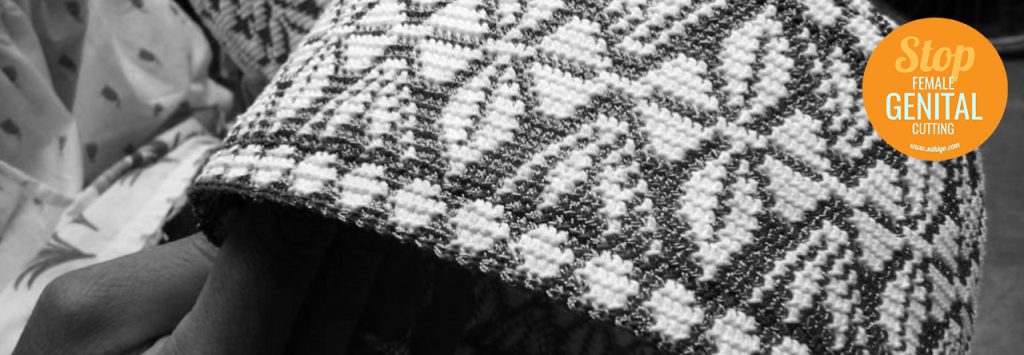
by Anonymous Age: 28 Country: United States Hello All, Firstly, I would like to start by telling you how ashamed I feel of being so ignorant about the issue of female khatna and how honored I am to be a part of a family whose women are spearheading the fight against FGM. I am from an Islamic Dawoodi Bohra family that comprises mainly of women. I have six beautiful sisters. They have all undergone khafd (khatna). Back then, there was no awareness and there was tons of social pressure. Everything was done quietly and no one spoke about it. At least in my community, it was a given that a girl child had to have her khatna done. Not doing it would be condemned. Women who have gone through FGM have started talking about their experiences. Openly speaking about this issue has done great good for the community as it has helped build awareness and made folks like me, who were ignorant about it, read and learn more about it. I salute the women who have been bold to talk about this. Thank you! Listening to these experiences makes me really sad. Sad because this has been going on for so long and this practice has absolutely no foundation. It makes me sad that educated people never questioned it and were so socially engrossed that they just did what they were told to do. It makes me sad because it just proves how sexist the world is (which I do not want to believe). It saddens me because parents are still putting their daughter through this. For my religious friends: the Quran does not even mention khatna. So please do not put a religious aspect to this practice. This practice only has side effects. For those who are not aware – please please read here. More importantly – it is her body, please respect it. This issue is important and it must be dealt with. It needs support from each and every member of the community including the men.
Why this Bohra father is guilty about his daughter’s Khatna
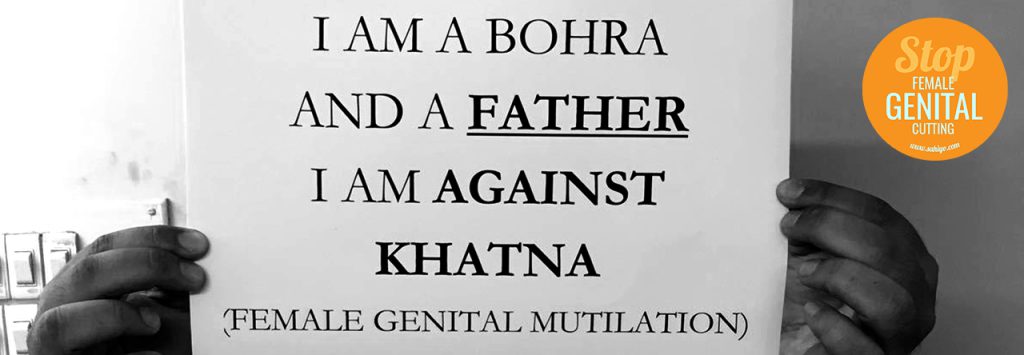
(First published on May 5, 2016) Name: Yusuf Country: India The fatwa given during the Zikra majlis by Syedna Mufaddal Saifuddin in favor of female genital cutting dug up the wound that exists in my heart which makes me write this post. Looking at parts from the audio clip leaked from the majlis, at one point, Syedna Mufaddal Saifuddin says what translates to English as: “It must be done. If it is a man, it can be done openly and if it is a woman it must be discreet. But the act must be done. Do you understand what I am saying? Let people say what they want.” The Syedna made no direct mention of the word “khatna” or “khafz”, but asks that the act be done discreetly for girls so that the community does not get tangled in any legal trouble. He cryptically says, “Do you understand what I am saying?” It was a clear reference to female genital mutilation (FGM). It is obvious that this was in response to the raging debate on FGM that has occurred in public after three Bohras were convicted in Australia for practicing khatna on two minor girls. No one from the clergy has come forward to participate in this debate, and the Syedna in his fatwa said, “We are not willing to talk to anyone on this issue”. The reason this issue dug up a wound in my heart is that a couple of years ago my daughter was made to undergo this barbaric ritual, against my wishes, under pressure from family elders and the ladies in particular. A year before my daughter turned seven, my wife told me that when our daughter turns seven we have to do her khatna. Unlike most men in the community, I was aware of what khatna or FGM is and I told her that I will not allow this. I told her this practice was started centuries ago by Bohras who wanted to curb the sexual desire of their women, as they frequently traveled for business. I told her that there is no scientific/medical basis for khatna or FGM. There is no mention of it in the Quran and that other Muslim sects do not practice it. I even told her that it is illegal in the western world and has been declared a violation of human rights by the United Nations. What I also did was initiate a discussion within my close Bohra friend group. I raised the issue as to why a girl who doesn’t understand what is going on or what’s being done to her has to go through this, especially when the ones taking her for the cut are people she trusts. One reply I received from a female friend in the group is etched in my memory. She said, “Would you want your daughter to have multiple sex partners and have extramarital affairs?” I was taken aback by the reply, particularly as this friend is a well-educated person otherwise! It left me in despair on realizing the extent of falsehoods that have been propagated within the community, with people being brainwashed into believing something as barbaric as khatna, which has no scientific basis and is a violation of human rights. Forcibly doing something that is thought to curb sexual desire is in itself a violation of human rights. If educated young women of the community think in this manner, what to say of the elders who still dominate decision-making in the majority of Bohra households? My wife agreed with me and was reluctant to put our daughter through the horror. She told my mom and her mom that I was against the decision. She was told by both that there would be no argument and that this centuries-old practice has to continue just like how they went through it. Being the only son, I live with my parents. My wife was torn between me on one side and my mother and her mother on the other. Talking to my parents did not help and ended with the usual invocation that it’s a “religious obligation”, Moula, tears, emotions, etc. My wife and I left the matter there hoping that when the time came, we could fake it. But, when my daughter turned seven, my mom said she would accompany us to take our daughter to get her khatna. She wouldn’t let us go alone. She made sure the appointment with a Bohra gynecologist (sigh!) was made. My daughter was put under the blade. The fault is mine. Maybe I wasn’t strong enough or forceful enough then to prevent that atrocity on my daughter. But, now that there is a perfidious attitude where on one hand there is this fatwa in favor of the practice, while on the other hand, jamaats in Western countries have issued letters telling citizens to refrain from the practice, I thought it is time we men from the community spoke out against it. It is time for Bohra men to be informed about this evil practice and come out against it to save their daughters. As it is well-known that the consequences of openly raising your voice against the Syedna has dire consequences, it is going to be difficult to get rid of this practice by mobilizing support from within the community. Some people may be against it, but they don’t say it openly. In my opinion, building support in the larger civil society and legal recourse is the best way to end the practice. Maybe a public interest litigation (PIL) in India will get positive result. There is already a raging debate in India over triple talaq after a lady filed a PIL against it, and it has got larger public attention and support. I commend the members of Sahiyo who are fighting against FGM. This post is my small contribution in support of their effort for a common good. ~ Written by Yusuf, a guilt-ridden and remorseful father belonging to the Dawoodi Bohra community.
My father did not allow khatna to happen to me

By: Aiman Age: 26 Country: United States I am a 26-year-old Indian female born and raised in the United States. I come from a Dawoodi Bohra family. I only recently found out about khatna, or female genital cutting, when my cousin exposed me to the issue. It came as a shock to find out that this practice had happened to many of the women in my family. I was overcome with horror and sadness at learning that information. I wondered why khatna hadn’t happened to me. After all, I went to India so many times as a child and stayed with my mother’s family, who supported this practice. Wanting to learn more about it, I decided to reach out to my mother. My mother told me that at the time it was a very common practice and they all had it done. She also told me that she didn’t know why it was performed. She told me she was mad when it happened to her because it hurt her, but she was not mad at her mother. Her mother didn’t know any better, my mother said, it was tradition and no one questioned it. My mother went on to tell me that the reason it did not happen to me was because my father was against it, and would not allow it to be done to me. I feel extremely lucky to have such a progressive father, who did not support this practice. But knowing that this has happened to my cousins, in India, and in America, is heartbreaking. I am in full support of my family members speaking out against the practice and letting the world know that this is not right and should not occur anymore.
The Role of Men in Ending FGM in the Bohra Community
